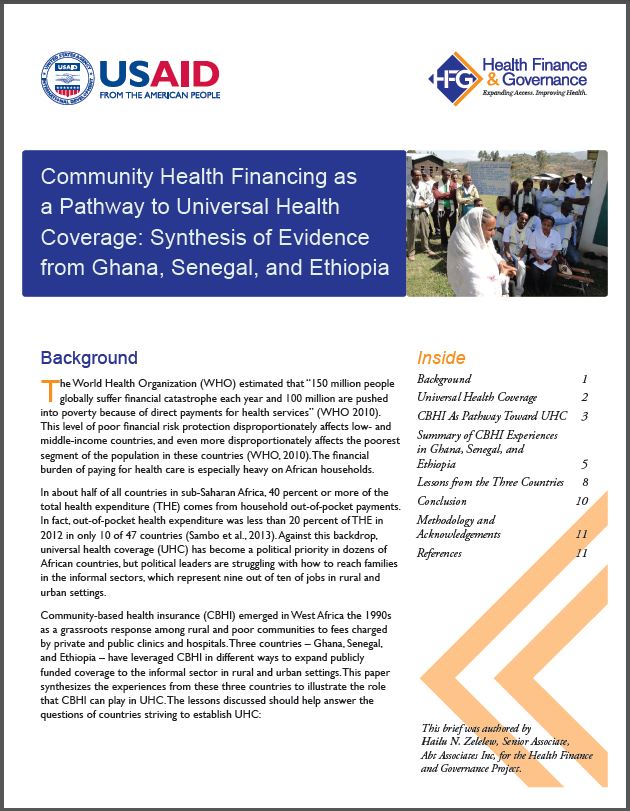Community Health Financing as a Pathway to Universal Health Coverage: Synthesis of Evidence from Ghana, Senegal, and Ethiopia
Categories: Health Insurance (CBHI, SHI), Publications, Universal Health Coverage
Resource Type: Brief
Authors: Hailu Zelelew
Published: June 2015
Resource Description:
 In about half of all countries in sub-Saharan Africa, 40 percent or more of the total health expenditure (THE) comes from household out-of-pocket payments. In fact, out-of-pocket health expenditure was less than 20 percent of THE in 2012 in only 10 of 47 countries (Sambo et al., 2013). Against this backdrop, universal health coverage (UHC) has become a political priority in dozens of African countries, but political leaders are struggling with how to reach families in the informal sectors, which represent nine out of ten of jobs in rural and urban settings.
In about half of all countries in sub-Saharan Africa, 40 percent or more of the total health expenditure (THE) comes from household out-of-pocket payments. In fact, out-of-pocket health expenditure was less than 20 percent of THE in 2012 in only 10 of 47 countries (Sambo et al., 2013). Against this backdrop, universal health coverage (UHC) has become a political priority in dozens of African countries, but political leaders are struggling with how to reach families in the informal sectors, which represent nine out of ten of jobs in rural and urban settings.
Community-based health insurance (CBHI) emerged in West Africa the 1990s as a grassroots response among rural and poor communities to fees charged by private and public clinics and hospitals. Three countries – Ghana, Senegal, and Ethiopia – have leveraged CBHI in different ways to expand publicly funded coverage to the informal sector in rural and urban settings. This paper synthesizes the experiences from these three countries to illustrate the role that CBHI can play in UHC. The lessons discussed should help answer the questions of countries striving to establish UHC:
- How can CBHI be a pathway toward UHC in low- and middle-income countries?
- How are CBHI schemes adapted or designed and implemented to cover the poor and informal sector?
- What are the challenges of CBHI initiatives and how can they be overcome?



